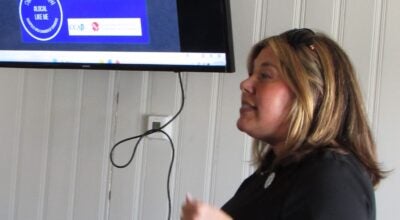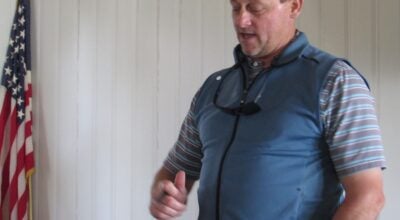Uniontown holds public meeting on sewer issues
Published 8:32 am Friday, December 23, 2016
Some Uniontown citizens were shocked the evening of Monday, Dec. 5, while others were disappointed after a public hearing at city hall regarding the state of the city’s sewage system.
Mary Shaeffer, who was raised in Uniontown and moved back in 1999, was in the audience Monday night when an engineer showed a slideshow of pictures and videos of the pipes that run under Uniontown streets to collect sewage from homes and businesses that are cracked, collapsed and covered in holes.
“I’m at a loss for words. I don’t really know how it can be fixed, but it’s got to be fixed somehow,” she said Tuesday after having time to digest the images and videos she saw Monday.
“We knew that there were issues with them, but I had no idea that it was as bad as it looked. This town has been around for a long time, so I guess a lot of it has had time to deteriorate.”
Ed Morris, the project engineer who is over the task of finding a way to fix the town’s sewage problem, was at the helm of the slideshow Monday, giving residents a history of the system and how it got to where it is today.
“They realized the shape of what things were,” Morris said. “And when I was saying the reason they cannot treat their sewage is because there is so much water going to the treatment facility they understood now where the water is coming from.”
The excess water the system is taking on has caused the system to backflow and overflow into nearby creeks and ditches.
Uniontown’s sewage system starts with collection through pipes. The sewage then goes to a lagoon where it is treated by bacteria. The water is then piped to a sprayfield, where it seeps back into the ground. That is the way the system was designed, but it hasn’t been working that way because of a deteriorated collection system made of terracotta clay.
“It was designed for 525,000 gallons per day. They were expecting on average about 350,000 gallons per day to go through there,” Morris said. “Now, because of all the holes and everything, when you get an inch of rain, there’s two million gallons per day going through that system.”
When it rains more than usual, that amount goes up to five million gallons of water per day.
Ben Eaton, who has lived in Uniontown for the last 31 years, said the information shared Monday night is nothing new to Uniontown residents. He said he hoped to hear of a solution.
“Why are we listening to the same old story,” Eaton questioned. “We knew our pipes were bad before, but they didn’t fix them. It’s really not helpful to us at all.”
Eaton said Uniontown’s sewer issues have gone on too long, and he puts much of the blame on city officials for a lack of effort.
“They have been playing around with this thing,” Eaton said. “We have to come up with a way to fund this project, but you have to make a sound educated decision as to which [option] you’re going to go with. They’re not doing anything.”
Multiple phone calls to Uniontown Mayor Jamaal Hunter following the meeting were not returned.
Morris said the city has been given four options by Sentell Engineering to treat its sewage. The first option is to build a wetlands facility and discharge treated water into Freetown Creek. The second option is to upgrade the city’s current lagoon and discharge treated water to the Black Warrior River. Option three is to build a mechanical plant and discharge into Freetown Creek, and option four is to build a plant and discharge into the Black Warrior River.
“For all those [options] they have to fix the collection system. That’s not an option. That’s part of their permit requirement,” Morris said. “As soon as we find out how much it is going to cost for the collection system, they can go forward with which option that they want to choose.”
Morris said part of the city still requires surveillance in the collection system, but the final decision will fall on the city, which doesn’t have much time due to a court order. Morris said a court order filed in 2015 called for Uniontown to cease and desist sewage operations, but a judge stayed the order to allow time for an engineering report. The order was stayed for a second time to allow the report to be sent with options for the city. Morris said the second stay is almost up.
Each option the city was given ranges from $11 million to $16 million dollars.
It is unclear when the city plans to vote on an option. Another meeting is planned for January between Sentell engineering and the city.





